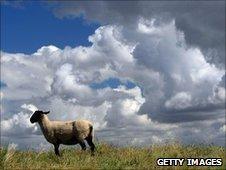Sheep decline 'raises tick risk' says NFUS
- Published

NFUS has warned farming in some areas is in decline
A decline in the sheep industry has led to an increase in harmful ticks, the National Farmers' Union of Scotland (NFUS) has warned.
Lyme disease, an infection that can cause arthritis if untreated, can be transmitted to humans through a tick bite.
The NFUS said sheep act as a "mop" as ticks attach themselves to the animals as they graze.
Sheep also keep down long grass which ticks use to reach anything passing by.
Robert Macdonald, who farms near Grantown-on-Spey and is NFUS Highland branch vice-chairman, said there has been a definite increase in the pest.
He said: "I put it down to there being less stock on the ground now.
"Because of that, there is more rank growth and this gives cover for the ticks. Deer also come in and they shed ticks into that growth."
'Spiralling costs'
Mr Macdonald knows two farmers infected with Lyme disease.
He said: "For one of them it has really affected his life.
"He had to get rid of his stock because he wasn't fit to look after them once he took Lyme disease."
In May, the NFUS warned that traditional sheep farms in upland areas and on crofts would not survive without the support of European subsidies.
NFUS head of rural policy Jonnie Hall said livestock production in hill areas was already in decline.
He said the EU single farm payment scheme was due for reform in 2013 and that he hoped its replacement would be focused on helping productivity.
Mr Hall was giving evidence to a rural affairs and environment inquiry.
He told the inquiry in the Scottish Parliament that "spiralling costs" for feed, fuel, fertiliser and labour had almost cancelled out any benefits from improved market prices for cattle and sheep.